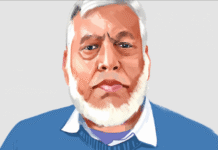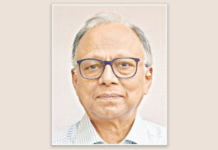When the planes crashed into the Twin Towers in New York City, I was tucked away in one corner of the Midwest, where the only previous Bengalis included Humayun Ahmed and a steady stream of engineers, the latter being our chief export, followed by clothing and bad news.
In those first few weeks of turmoil, fear, and confusion, there was a visible sense of panic and disorganization as the absurdity of America’s response made clear that regardless of culture, people are inherently the same. Manmade disasters may induce different initial responses than natural calamity, but the grief, the guilt, and the farcicality tend to track similar over a period of time.
Even as they were pulling people out of the rubble of the Twin Towers, there were some who suggested that it was an inside job, that the United States government somehow undertook this massive covert operation in order to fool everyone into blaming religious terrorists. Both the far right wing and the far left wing of American society indulged in myriad theories trying to explain what remains a pretty open and shut case.

I was personally baffled by the strangeness of the response. In retrospect, however, it provided my first real glimpse of not only collective human behaviour but also the fragmented nature of American society when truth becomes part of the political process and when the acceptance and the rejection of said truth becomes a matter for political manoeuvring. I felt ashamed of America when that realization dawned on me. That was a long time ago.
When the building collapsed in Rana Plaza, as the crumbling sound of each brick was accompanied by screams of mercy and as death echoed the ether with no real respite, it reminded me of the that day the Twin Towers collapsed. It is an unfair comparison for a million different reasons, and I know that. What is not so unique is the same sense of panic, fear, and embarrassment, and the valiant rescue effort to find as many survivors as possible.
However, like the tragedy of the Twin Towers, once that initial sense of unity came to pass, the truth became a victim of political manoeuvring. It started with the home minister and permeated various facets of the political elite for various reasons. This is realpolitik. All tragedies become currency to one group at the expense of another. This is nothing new.
The following media storm and damage control did more damage to Bangladesh’s image that we could ever imagine. The terrible interview of the Prime Minister on CNN, followed by the callous nature of politics-as-usual within a week or so by everyone else, only showed that as a country that suffers from a thousand different calamities each year, Bangladesh never suffers from an intelligent political structure providing an intelligent response.
As the death toll continued to mount, along came Reshma.
In the middle of the rubble of this gigantic structure, in the middle of death and destruction unseen to most of us, she survived 17 days. Not hours, but days! How she survived no one really knows, but she did. And that resilience is indisputable.
At least, that is what I thought. Until I was told that her resilience is becoming a theatre of sorts, a politics of doubt without rationality.
I was forwarded a plethora of comments and reactions from Bangladeshis on various social networking outlets, and as the days went by, these comments shifted from a simple sense of grief and relief to an outright inquisition about her survival. Now it seems that it is snowballing into a 911-conspiracy-theory-like-beast that erodes confidence in human decency for the sake of political score settling.
The general insinuation in this concentrated effort is to shame the government, but it is coming at the expense of Reshma. The collective effort to discard her as a pawn, an implant by the government, is offensive. It is offensive not only to her as a person, but also to anyone who invested a single iota of effort in Savar rescue attempts.
It seems that politics will remain the same. We will go through the motions of the cycles that are birthing pains of an illiberal democracy until we progress incrementally towards a more egalitarian society. That is the process. That is accepted. That is understood. But this woman’s survival needs to be viewed as one thing our fragmented society can agree upon.
We must all be vigilant about this sort of political partisanship digging its teeth into our own conscience. I was embarrassed when I saw Sheikh Hasina’s interview, I was embarrassed to hear MK Alamgir’s absurd statements, I was embarrassed to hear short term reactionary madrassah proclamations coming out of Shahbagh, I was embarrassed to see poor students being used as pawns for the opposition, I was embarrassed to hear mosques being used to incite people in Fakirchari, I was embarrassed to see the burnt temples in Ramu, but I will not feel embarrassed for this young woman who survived 17 DAYS in a rubble of death and destruction just because it will make the inept government response seem more insidious than it is.
We must look beyond the rubble of Savar and the rubble of political partisanship to deter any effort that looks at short term goals at the expense of human dignity. If we don’t nip this in the bud, we will end up not only ashamed of the political elites of this country, but of ourselves.
Source: Bd news24










